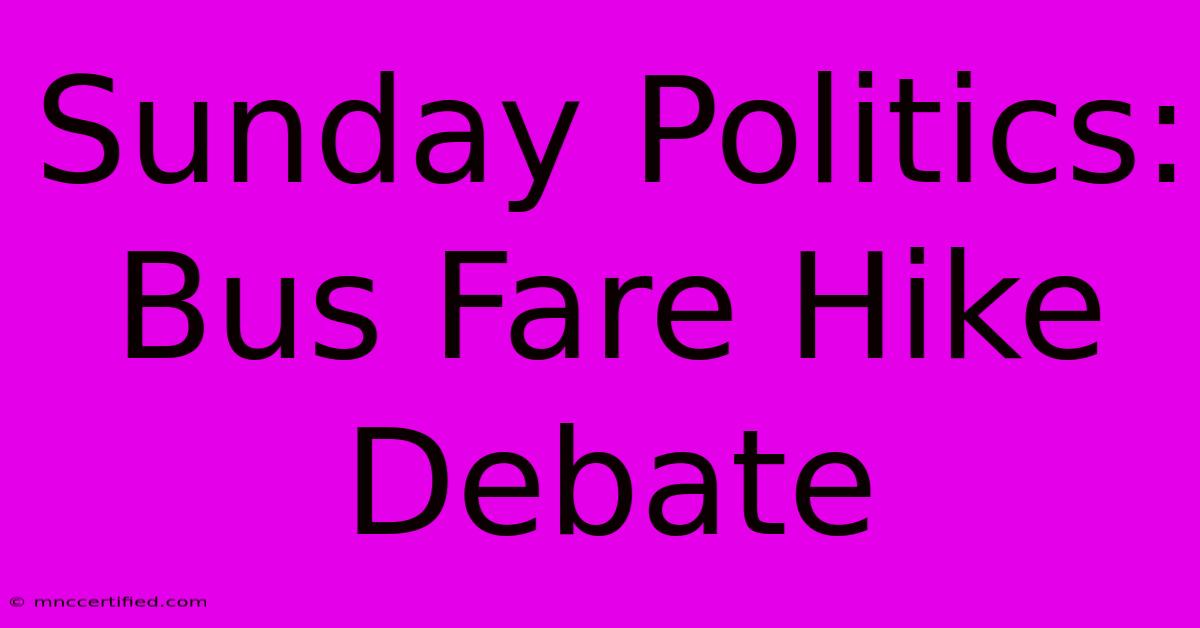Sunday Politics: Bus Fare Hike Debate

Table of Contents
Sunday Politics: Bus Fare Hike Debate
The recent announcement of a bus fare hike has ignited a firestorm of debate across the country, dominating Sunday morning political talk shows and social media feeds alike. This article delves into the key arguments for and against the increase, exploring the perspectives of different stakeholders and examining the potential consequences.
The Case for the Fare Hike: A Necessary Evil?
Proponents of the bus fare increase argue that it's a necessary measure to address the escalating costs of maintaining and improving public transportation. They point to several key factors:
-
Rising Operational Costs: Fuel prices, maintenance expenses, and driver salaries have all increased significantly in recent years. These rising operational costs, they argue, necessitate a fare adjustment to ensure the continued viability of the bus system. Without the increase, service cuts or a decline in service quality are inevitable.
-
Investment in Infrastructure: Increased fares can fund vital improvements to the bus system, including the purchase of new, more fuel-efficient buses, upgrades to existing infrastructure, and the expansion of service routes to underserved areas. This investment, proponents argue, will lead to a more efficient and reliable public transportation network in the long run.
-
Addressing Budget Deficits: Many public transportation systems operate with limited budgets. The fare hike, they argue, is a necessary step to address existing budget deficits and ensure the long-term financial health of the system.
The Case Against: Burdening the Public
Opponents of the fare hike argue that it unfairly burdens commuters, particularly low-income individuals and families who rely on public transportation as their primary mode of commuting. Their arguments include:
-
Disproportionate Impact on Low-Income Communities: A fare increase disproportionately affects low-income individuals who may struggle to absorb the added cost. This could lead to reduced access to employment, education, and essential services.
-
Lack of Transparency and Accountability: Critics argue that there is a lack of transparency surrounding how the increased revenue will be used. They demand greater accountability and a detailed breakdown of how the funds will be allocated to ensure that the money is used efficiently and effectively.
-
Alternatives to Fare Increases: Opponents suggest exploring alternative solutions to address budget shortfalls, such as seeking increased government funding, implementing efficiency measures, or exploring innovative funding models.
The Role of Government Subsidies
A crucial aspect of this debate centers on the role of government subsidies in funding public transportation. Proponents of increased subsidies argue that government investment is essential to ensure affordable and accessible public transportation for all. Opponents, however, might raise concerns about the burden on taxpayers and the potential for inefficient use of public funds. The optimal balance between fares and subsidies remains a key point of contention.
The Public's Perspective: Beyond the Headlines
Public opinion is deeply divided on the issue. Social media is flooded with passionate arguments from both sides. Many commuters express frustration with the rising cost of living and the added financial strain imposed by the fare increase. Others acknowledge the need for investment in public transportation but question the fairness and effectiveness of the current approach. Understanding public sentiment is crucial for policymakers to navigate this complex issue.
Conclusion: Navigating a Difficult Issue
The bus fare hike debate highlights the inherent tension between the need to maintain and improve public transportation and the desire to ensure affordability and accessibility for all. Finding a sustainable solution that balances these competing interests requires careful consideration of various factors, including operational costs, infrastructure needs, government subsidies, and the impact on different segments of the population. Open dialogue and transparent communication between policymakers, transit agencies, and the public are essential to navigate this complex and politically charged issue. The coming weeks will likely see further debate and potentially, revisions to the proposed fare increase.

Thank you for visiting our website wich cover about Sunday Politics: Bus Fare Hike Debate. We hope the information provided has been useful to you. Feel free to contact us if you have any questions or need further assistance. See you next time and dont miss to bookmark.
Featured Posts
-
Control Of Well Insurance Coverage
Nov 17, 2024
-
Charli Xcxs 360 And Sympathy Snl
Nov 17, 2024
-
Jon Kenny Banshees And Father Ted
Nov 17, 2024
-
Independent Trading Co Windbreaker
Nov 17, 2024
-
Merseyside Snow And Ice Latest Met Office Alert
Nov 17, 2024